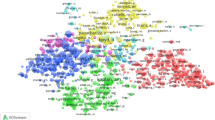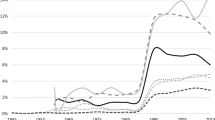Summary
With the rise of the Internet, the ubiquitous presence of ICT and the support of certain forms of prosocial behaviour, collaborative production and decision processes are discussed as new tools of the 21st century. This article gives an overview of trends, conditions and developments in the field of social collaboration. It addresses collaboration models in the network society and the opportunities for politics and public administration from this perspective.
Zusammenfassung
Mit der Verbreitung des Internets, der umfassenden Präsenz sozialer Medien und der damit einhergehenden Unterstützung bestimmter Formen prosozialen Verhaltens werden kollaborative Produktions- und Entscheidungsprozesse als neue Werkzeuge des 21. Jahrhunderts diskutiert. Dieser Artikel gibt einen Überblick über die Trends, Bedingungen und Entwicklungen im Bereich "Social Collaboration". Angesprochen werden Kollaborationsmodelle in einer vernetzten Gesellschaft sowie die Möglichkeiten, die sich für Politik und Verwaltung aus dieser Perspektive stellen.
Similar content being viewed by others
Literatur
Allan, R. (2009): The Power of Government Information. In: Gøtze, J., Bering Pedersen, C. (Hg.): State of the eUnion. Online: http://21gov.net/wp-content/uploads/e-book.pdf, S. 143–160 (Zugriff: 10. 10. 2011)
Bayer, H.-P. (2011): Wertschöpfung im Wissenszeitalter. In: Upgrade. Das Magazin für Wissen und Weiterbildung. Ausgabe 4.10., S. 9–11
Burov, V., Patarakin, E., Yarmakhov, B. (2011): Lawmaking in Democracy 2.0 Paradigm. The Shift for the New Forms of Lawmaking. In: Estevez, E., Janssen, M. (Eds.): Icegov 2011. Proc. of the 5th Int. Conf. on Theory and Practice of Electronic Governance. New York, USA: ACM, S. 214–219
Chesbrough, H. W. (2003): Open Innovation. The New Imperative for Creating and Profiting from Technology. Boston: Harvard Business School Press
Chesbrough, H. W., Garman, A. R. (2009): How Open Innovation Can Help You Cope in Lean Times. Harvard Business Review, December 2009, S. 68–80
Ciffolilli, A. (2003): Phantom authority, self-selective recruitment and retention of members in virtual communities: The case of Wikipedia. First Monday, 8 (12). Available at: http://www.firstmonday.org/issues/issue8_12/ciffolilli/ (Zugriff 30. 5. 2010)
Di Maio, A. (2011): Governments must become smart to survive and be smart to get there. http://blogs.gartner.com/andrea_dimaio/2011/06/21/governments-must-become-smart-to-survive-and-be-smart-to-get-there/ (Zugriff: 10. 10. 2011)
Dietrich, D. (2010): Offene Daten für Deutschland. Chancen und Herausforderungen für die Zukunft. In: Internet und Gesellschaft Co:llaboratory: "Offene Staatskunst". Bessere Politik durch "Open Government"? Abschlussbericht Oktober 2010, S. 49–79. http://www.collaboratory.de/open-government/abschlussbericht2 (Zugriff: 10. 10. 2011)
Erkkilä, T. (2010): Reinventing Nordic Openness: Transparency and State Information in Finland. Ph.D. Thesis, Helsinki: University of Helsinki ( = Acta Politica 40)
Fischer, C. S. (1994): America Calling: A Social History of the Telephone to 1940. Berkely: University of California Press
Fuchs, C. (2011): New Media, Web 2.0 and Surveillance. In: Sociology Compass 5/2 (2011): S. 134–147
Kunstek, R. (1986): Das Konzept der Lernstatt im Industriebetrieb, Kritik eines Ansatzes der Organisationsentwicklung. Spardorf: R. F. Wilfer
Müller, P. (2010): Offene Staatskunst. In: Internet und Gesellschaft Co:llaboratory: "Offene Staatskunst". Bessere Politik durch "Open Government"? Abschlussbericht Oktober 2010, 11–27. Online: http://www.collaboratory.de/open-government/abschlussbericht2. (Zugriff: 10. 10. 2011)
Obama, B. (2009): Transparency and Open Government. The White House, 2009. http://www.whitehouse.gov/the_press_office/Transparency_and_Open_Government (Zugriff: 10. 10. 2011)
Parks, W. (1957): Open Government Principle: Applying the right to know under the Constitution. In: George Washington Law Review 26/1, S. 1–22
Parycek, P., Sachs, M. (2010): Open Government. Information Flow in Web 2.0. In: European Journal of ePractice, No. 9, March 2010. http://www.epractice.eu/files/European%20Journal%20epractice%20Volume%209.5.pff (Zugriff: 10. 10. 2011)
Parycek, P., Schossböck, J. (2011): Transparency for common good. Offener Zugang zu Information im Kontext gesellschaftlicher und strategischer Spannungsfelder. http://epub.oeaw.ac.at/?arp=0x0025503b (Zugriff: 10. 10. 2011)
Peddibhotla, N. B., Subramani, M. R. (2006): Understanding the motivations of contributors to public document repositories: An empirical study. In Academy of Management Annual Meeting. Atlanta, Georgia, USA
Pisano, G. P., Verganti, R. (2008): Which Kind of Collaboration is Right for You? Harvard Business Review 86 (12), S. 78–86
Rogers, E. M. (2003): Diffusion of Innovations, 5. Ausg., New York: Free Press
Rosen, E. (2007): The Culture of Collaboration. San Francisco: Red Ape Publishing
Schrage, M. (1995): No More Teams. New York: Currency Coubleday
Tapscott, D., Williams, A. (2006): Wikinomics: how mass collaboration changes everything. New York: Portfolio
Tapscott, D., Williams, A. D., Herman, D. (2007): Government 2.0: Transforming government and governance for the twenty-first century. New Paradigm
White, R. W. (1959): Motivation reconsidered: The concept of comptence. Psychological Review, 66, S. 297–333
Author information
Authors and Affiliations
Rights and permissions
About this article
Cite this article
Parycek, P., Schossböck, J. The User-generated State – von der Informationsbereitstellung zu "Social Collaboration". Elektrotech. Inftech. 129, 67–71 (2012). https://doi.org/10.1007/s00502-012-0078-0
Received:
Accepted:
Issue Date:
DOI: https://doi.org/10.1007/s00502-012-0078-0




